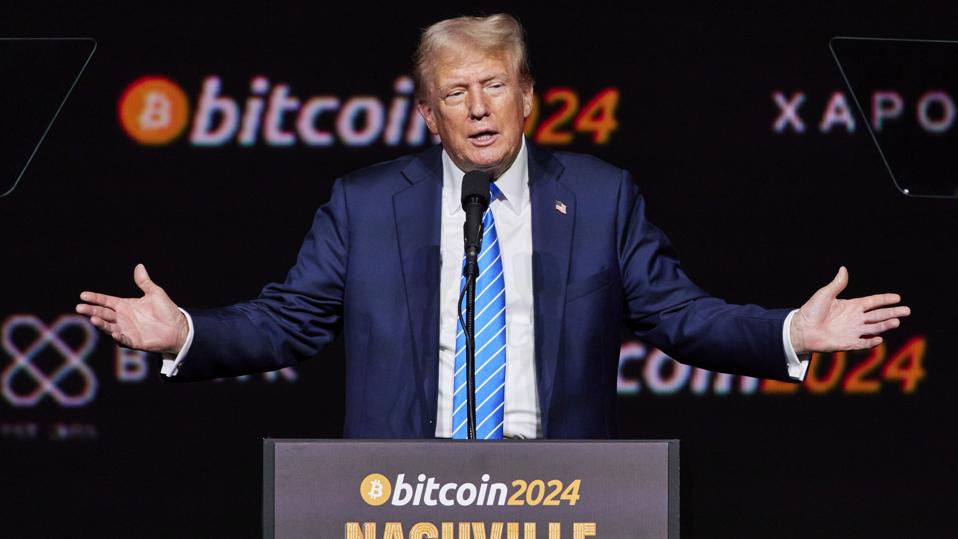Topline
The price of Bitcoin breached $82,000 for the first time ever early on Monday, continuing its post-election bull run as President-elect Donald Trump has promised to bolster the industry while several pro-crypto candidates won down-ballot races.

President-elect Donald Trump has promised to enact pro-cryptocurrency policies after taking office.
The Washington Post via Getty Images
Key Facts
The world’s most valuable cryptocurrency hit an all-time high of $82,197 in early Monday trading, up more than 19.5% compared to last week.
Bitcoin breached the $80,000 mark for the first time on Sunday after a big weekend rally—breaking the election night high of $75,000.
The price of Ether—the second most valuable crypto token—has risen by an even bigger 28.7% over the past week to $3,165.
Other popular crypto tokens including Dogecoin, Solana’s SOL and Binance’s BNB have also surged in value in the past week—with volatile and popular meme coin DOGE’s price rising by 83%.
The crypto price boom has led to surge in the share price of related stocks like Coinbase—whose price has surged 50% in the past five days and is up another 15.6% in pre-market trading early on Monday to $312.92.
Trump is expected to usher in a new wave of crypto-friendly policies with ease after Republicans flipped control of the Senate Tuesday and are on the brink of maintaining their majority in the House.
Get Forbes Breaking News Text Alerts: We’re launching text message alerts so you’ll always know the biggest stories shaping the day’s headlines. Text “Alerts” to (201) 335-0739 or sign up here.
How High Could Bitcoin Prices By The End Of This Year?
While estimates have varied slightly, most analysts agreed a Trump win would lead to a boom in cryptocurrency prices. Bernstein analysts led by Gautam Chhugani said Bitcoin can rise to $80,000 to $90,000 over the next two months if the “pro-crypto candidate” Trump won. Last month, Standard Chartered analyst Geoff Kendrick wrote he expects Bitcoin to hit $125,000 by the end of the year in the event of a Trump win.
Key Background
Trump has embraced the crypto industry as a counter to the Securities and Exchange Commission’s stricter regulatory approach under President Joe Biden, vowing to make the U.S. the “crypto capital of the planet.” Trump’s pro-crypto stance marks a reverse course from his previous skepticism of the industry, which he called a “scam” and a disaster waiting to happen in 2021. Trump has vowed “to keep 100% of all the bitcoin the U.S. government currently holds or acquires into the future,” he told an audience at a bitcoin conference in Nashville in July, and he has repeatedly promised to “fire” SEC Chairman Gary Gensler, who has taken more than 100 regulatory actions against crypto during his tenure, according to CNBC. Trump earned endorsements from crypto leaders, including billionaires Marc Andreessen, Cameron Winklevoss and Tyler Winklevoss, while Vice President-elect, Sen. JD Vance, R-Ohio, is a longtime bitcoin investor. Trump and his campaign have also personally invested in digital currency—Trump’s joint fundraising committee began accepting donations via Coinbase in May, and he debuted his own family cryptocurrency platform, World Liberty Financial, in September.
News Peg
The crypto industry was the largest corporate donor in the 2024 election cycle, according to a report by the progressive consumer advocacy group, Public Citizen, which found donations from the industry accounted for 44% of all corporate money contributed as of August. The vast majority of the money was funneled through the super PAC Fairshake and two affiliated super PACs, Defend American Jobs, which backs Republicans, and the pro-Democrat Protect Progress. The groups—financed primarily by crypto companies Coinbase and Ripple—spent a combined $135 million supporting industry-friendly candidates in federal races, according to The New York Times. The investment appears to have paid off: as of Sunday, 268 pro-crypto candidates had been elected to the House and 19 in the Senate, according to the non-profit, Stand With Crypto, compared to 122 newly elected House members and 12 senators it deems “anti-crypto.”
Tangent
Aside from Trump, one of the biggest wins for the crypto industry came in the Ohio Senate race, where blockchain entrepreneur and GOP candidate Bernie Moreno defeated incumbent Sen. Sherrod Brown. Brown served as the chair of the Senate Banking Committee and was a vocal opponent of efforts to loosen cryptocurrencies-related regulations. Coinbase CEO and co-founder Brian Armstrong reacted to the result of the Ohio Senate race by tweeting, “Being anti-crypto is simply bad politics.”
Further Reading
Here’s Where Analysts Expect Bitcoin Prices Will Head Under Harris And Trump (Forbes)
Trump Used To Think Crypto Was A ‘Scam’ — Now He’s Launching His Own Crypto Platform Run By His Sons (Forbes)
Trump Campaign Now Accepts Crypto Donations (Forbes)